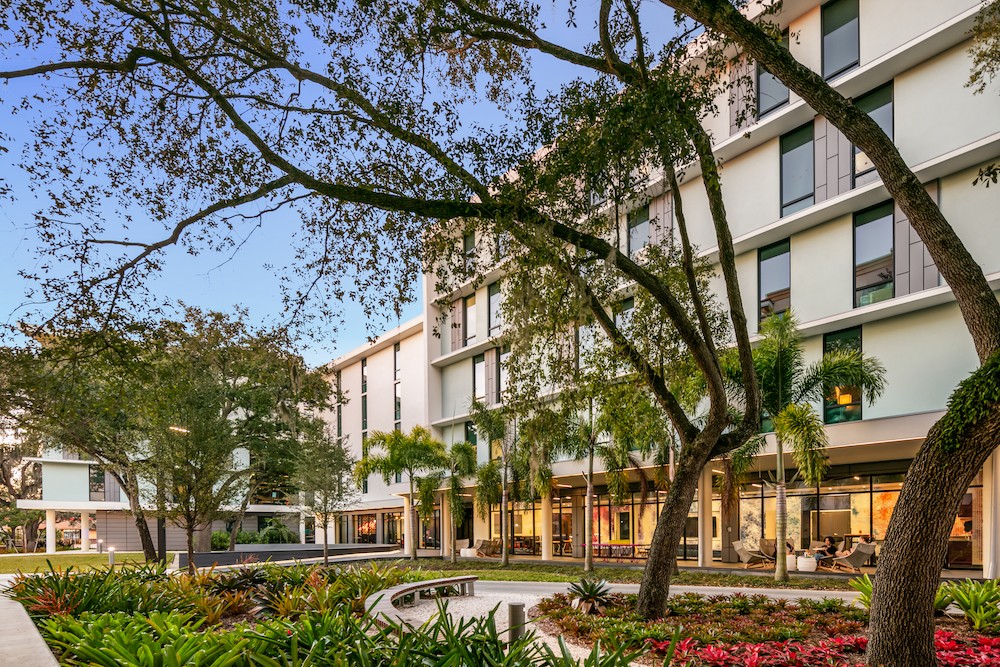Getting Creative About Resiliency
Guest Correspondence
SRQ DAILY SATURDAY PERSPECTIVES EDITION
SATURDAY NOV 25, 2023 |
BY DR. LARRY THOMPSON
Photo courtesy Ringling College: Ringling College's Greensboro Hall, a residence hall for incoming freshmen.
At the risk of speaking too soon, it seems we have made it through another hurricane season unscathed, despite forecasts predicting a more active season than ever before. Especially in Florida, environmental and sustainability issues, topics surrounding climate change and “going green” are ever present and highly debated. Everyone from politicians to corporations to small businesses to the average homeowner are faced with daily decisions that directly result in positive or negative outcomes for the environment. College campuses are no different. No matter what side of the fence you sit on, these are certainly important issues to pay attention to and address.
I firmly believe college campuses — especially one such as Ringling College of Art and Design’s, situated on 60-plus acres of natural Florida land just a stone’s throw from Sarasota Bay — have a responsibility to align as much as possible with broader environmental goals. Working towards sustainable and renewable options can provide educational opportunities for students, contribute to significant financial savings for the institution, and can even contribute to student and employee health and wellbeing. But the most important benefit is to our natural environment.
As institutions of higher education, significant employers and community leaders, colleges have a two-fold obligation to set an example for the wider community. Focusing efforts around energy-efficient buildings, water-saving measures, solar power, recycling programs and waste reduction efforts are not just good for the environment; they can also often save the institution money in the long run, therefore freeing up funds for other educational purposes. At Ringling College, every new building on the campus has the goal of obtaining LEED Certification. In fact, many of the existing buildings maintain this certification, such as the Larry R. Thompson Academic Center, Goldstein Library, the Basch Visual Arts Center, Bridge Apartments and Greensboro Hall and new dining facility Cunniffe Commons. These ratings require verification of green features, sustainable design and construction, resource-efficiency and even the measure of air and water quality.
Supporting biodiversity is important as well. A few years ago, Ringling College’s campus was recognized for its exceptional landscaping and we are on a mission to receive this accolade again. But it’s not just about recognition. The multiple green spaces on campus help to support local flora, fauna and wildlife, especially insects and birds. Arborists from Tree Campus USA will soon come to Ringling to rate our trees for size, health and quantity and to map them as part of a larger conservation project. Our landscaping team is even working on a native planting program, to help ensure we are planting responsibly and not introducing harmful or invasive species. What’s more is that in addition to the obvious environmental benefits, these spaces are scientifically proven to help support mental health and wellbeing for students and employees alike.
One of our most prominent student-led organizations at Ringling College is the Green Ambassadors Club. These students promote and advocate for healthier and greener living on campus and help to create spaces for community members to explore how a more sustainable world can be built through art, design and creativity. This all links back to the College’s goal of producing graduates who are globally-minded citizens and ethical practitioners. In order to be prepared for the future, students must be engaged and aware of the interconnectedness of environmental, social and economic issues.
Sustainability on college campuses should no longer be seen as an “add on.” It must be an essential pillar for creating a holistic educational experience that minimizes environmental impact and teaches students to be environmentally conscious and inclined. We are so fortunate to live where we do, with such natural beauty surrounding us. But as we have seen many times, and our neighbors to the south of us experienced so acutely last year, this beauty is neither permanent nor indestructible. Our environment is fragile; our ecosystem is unstable. There is much work to be done for us to counteract the damages we as humans bestowed upon the planet. I truly believe, however, if we all take responsibility and make conscious steps now toward more sustainable and creative solutions, there will still be hope for us yet.
Dr. Larry R. Thompson is president of Ringling College of Art and Design.
Photo courtesy Ringling College: Ringling College's Greensboro Hall, a residence hall for incoming freshmen.
« View The Saturday Nov 25, 2023 SRQ Daily Edition
« Back To SRQ Daily Archive









